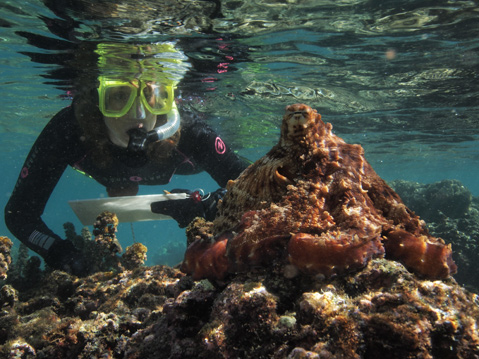Octopus Whisperer Speaks at Santa Barbara Zoo
Author Sy Montgomery Makes Stop to Promote New Book The Soul of an Octopus

Few creatures fascinate all ages as much as the octopus, and few humans have spent as much time with them as author Sy Montgomery, who will speak at the Santa Barbara Zoo on Sunday, June 7, at 7 p.m. to promote her new book, The Soul of an Octopus. (She also penned a book on the eight-legged beasts for kids called The Octopus Scientists.) Here are select snippets of our recent conversation.
How it started: In March 2011, I met my first giant Pacific octopus. Her name was Athena. I went behind the scenes at the New England Aquarium, and they opened up the tank. She looked at me and turned color with emotions and moved to greet me. I plunged my arms in the 47 degree water, and her arms came out of the water to embrace me with her suckers. She was just as curious about me as I was about her. I felt the cognition and consciousness of this creature was super impressive, how willing she was to have a meaningful interaction with a stranger. She also let me touch her head, and she turned white beneath my touch. That is the color of a relaxed octopus. I knew that not only was she curious but that she felt something about me.
Amazing traits: They are very intelligent, but they also have these superpowers. They can squeeze into a tiny space, they can change color, they have venom, and they are super-duper strong. Here’s a creature that is as alien as can be without leaving the planet, yet you can still have a meeting of the minds.
But a soul? I feel like if we have a soul, then an octopus has a soul. If we have consciousness, they have consciousness, but I think that consciousness may be more complex and varied than humans might be able to imagine. The octopus has more neurons in its brain than a rat, and rats are quite smart. But most of an octopus’s neurons aren’t even in its brain. Three-fifths of their brain neurons are in their arms. So consciousness may be felt totally different to an octopus.
“Exquisite” taste: They can taste with their entire bodies, including their eyelids. My friend the octopus could taste it was me and may have been able to taste whether I was happy or sad or got a perm. One of my friends, who is a great animal lover, touched one octopus, and it withdrew with revulsion. Then I remembered she is a pack-a-day smoker! Nicotine is a known invertebrate repellant, so she didn’t taste good.
Kids as conservationists: It’s really important to reach kids because they aren’t just the leaders of tomorrow; they’re the leaders of today. They are the biggest source of environmental information for their parents, even more than magazines, newspapers, and TV. Parents listen to their children, and they make a lot of choices based on what they’ve shared, from how they eat to even how they vote. Kids have a lot of power and have very flexible minds that are open to new concepts.



